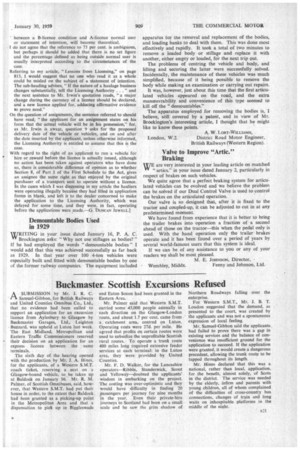Buckmaster Scottish Excursions Refused
Page 55

If you've noticed an error in this article please click here to report it so we can fix it.
A SUBMISSION by Mr. J. R. C. rx Samuel-Gibbon, for British Railways and United Counties Omnibus Co., Ltd., that no evidence had been called to support an application for an excursion licence from Aylesbury to Glasgow by Buckmaster Garages, Ltd., Leighton Buzzard, was upheld at Luton last week. The East Midland, Metropolitan and Eastern Traffic Commissioners reserved
-• their decision on an application for an express licence between the same terminals.
The sixth day of the hearing opened • with the production by Mr. J. A. Hines, for the applicants, of a Western S.M.T. coach ticket, reserving a seat on a Glasgow-bound vehicle, to be taken up at Baldock on January 30. Mr. R. M. Palmer, of Scottish Omnibuses, said, however, that Western S.M.T. had put their house in order, to the extent that Baldock had been granted as a picking-up point in the Metropolitan Area and that a dispensation to pick up in Biggleswade and Eaton Socon had been granted in the Eastern Area, Mr. Palmer said that Western S.M.T. carried some 45,000 people annually in each direction on the Glasgow-London route, and about 1.7 per cent, came from a catchment area, centred on Luton. Operating costs were 27d. per mile. He agreed that profits on certain routes were used to subsidize the unprofitable Scottish rural routes. To operate a trunk route 400 miles long required extensive feeder services at each terminal: in the Luton area, they were provided by United Counties.
Mr. F. D. Walker, for the Lancashire operators—Ribble, Standerwick, Scout and Yelloway—doubted the applicants' wisdom in embarking on the project. The costing was over-optimistic and they would have difficulty in finding 20 passengers per journey for nine months in the year. Even their private-hire journeys to Scotland had been on a small scale and he saw the grim shadow of Northern Roadways falling over the enterprise.
For Western S.M.T., Mr. J. B. T. Loudon suggested that the demand, as presented to the court, was created by the applicants and was not a spontaneous expression of local feeling.
Mr. Samuel-Gibbon said the applicants had failed to prove there was a gap in existing services and the balance of convenience was insufficient ground for the application to succeed. If the application were granted, it would create a dangerous precedent, allowing the trunk route to be tapped throughout its length.
Mr. Hines declared that this was a national, rather than local, application, for the benefit, almost solely, of Scots in the district. The service was needed by the elderly, infirm and parents with young children, all of whom complained of the difficulties of cross-country bus connections, changes of train and long waits on inhospitable platforms in the middle of the night.




























































































